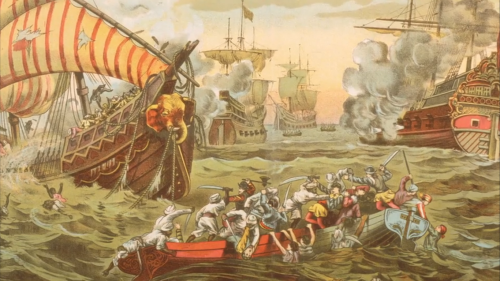POD
“January 12th of the year of our Lord 1491 marked the last day a man from Genoa named Christopher Columbus walked this God-given Earth. He had spent his days wishing to explore this world God has given us. He was a fine man, who unfortunately had to suffer through the Great Pox in his last days. He will be missed.”
-From the funeral procession of Christopher Columbus, 1491 [1]
The death of Christopher Columbus was not a major event. But his attempts to get an expedition to travel West to Asia did not go totally unnoticed by historians. He would be grouped in with other would-be explorers, such as Giovanni Caboto as a sort of what-if scenario for historians, to see if an earlier expedition West would even be possible. Most agree that Columbus wouldn’t have ever gotten funding, simply due to how he had completely failed to accurately calculate the circumference of the Earth, while most educated nobles knew of the true circumference of the Earth.
The Spanish peninsula[2] would be busy with the Reconquista for the time being, as Granada would hold out until 1492, when it fell to Castilian forces under Queen Isabella. The crown of Castile was not generous after this victory, as it would pass laws demanding the expulsion or conversion of all Jews and Muslims in its territory. This is thought by many historians to have occurred due to a siege mentality amongst the Castilians, as they came from a country that had been fighting Islam for around 700 years.
The year 1491 marked the end of Hungarian hostilities with the Holy Roman Empire, with the agreement that if Vladislaus II were to die without a male heir, Emperor Maximilian would take the thrones of Hungary and Bohemia as his successor.[3] This clause did not come into effect, with Vladislaus having a son in 1500.
Central Europe and Spain were not the only regions to have peace treaties. The British Isles had a peace treaty between Scotland and England in the late months of 1491.[4] This worked to halt the constant wars between England and Scotland for around 5 years, thus acting more as a truce than a full-fledged peace treaty.
Thus, the first few years of the 1490s were a bit peaceful and dull. No truly major events occurred, and almost all somewhat major events were rendered moot by later events, such as the reignition of the conflict between England and Scotland, and King Vladislaus having a child.
---
Footnotes
1: Translated into modern English for my benefit.
2: This is not a mistake
3: OTL
4: OTL
-From the funeral procession of Christopher Columbus, 1491 [1]
The death of Christopher Columbus was not a major event. But his attempts to get an expedition to travel West to Asia did not go totally unnoticed by historians. He would be grouped in with other would-be explorers, such as Giovanni Caboto as a sort of what-if scenario for historians, to see if an earlier expedition West would even be possible. Most agree that Columbus wouldn’t have ever gotten funding, simply due to how he had completely failed to accurately calculate the circumference of the Earth, while most educated nobles knew of the true circumference of the Earth.
The Spanish peninsula[2] would be busy with the Reconquista for the time being, as Granada would hold out until 1492, when it fell to Castilian forces under Queen Isabella. The crown of Castile was not generous after this victory, as it would pass laws demanding the expulsion or conversion of all Jews and Muslims in its territory. This is thought by many historians to have occurred due to a siege mentality amongst the Castilians, as they came from a country that had been fighting Islam for around 700 years.
The year 1491 marked the end of Hungarian hostilities with the Holy Roman Empire, with the agreement that if Vladislaus II were to die without a male heir, Emperor Maximilian would take the thrones of Hungary and Bohemia as his successor.[3] This clause did not come into effect, with Vladislaus having a son in 1500.
Central Europe and Spain were not the only regions to have peace treaties. The British Isles had a peace treaty between Scotland and England in the late months of 1491.[4] This worked to halt the constant wars between England and Scotland for around 5 years, thus acting more as a truce than a full-fledged peace treaty.
Thus, the first few years of the 1490s were a bit peaceful and dull. No truly major events occurred, and almost all somewhat major events were rendered moot by later events, such as the reignition of the conflict between England and Scotland, and King Vladislaus having a child.
---
Footnotes
1: Translated into modern English for my benefit.
2: This is not a mistake
3: OTL
4: OTL
